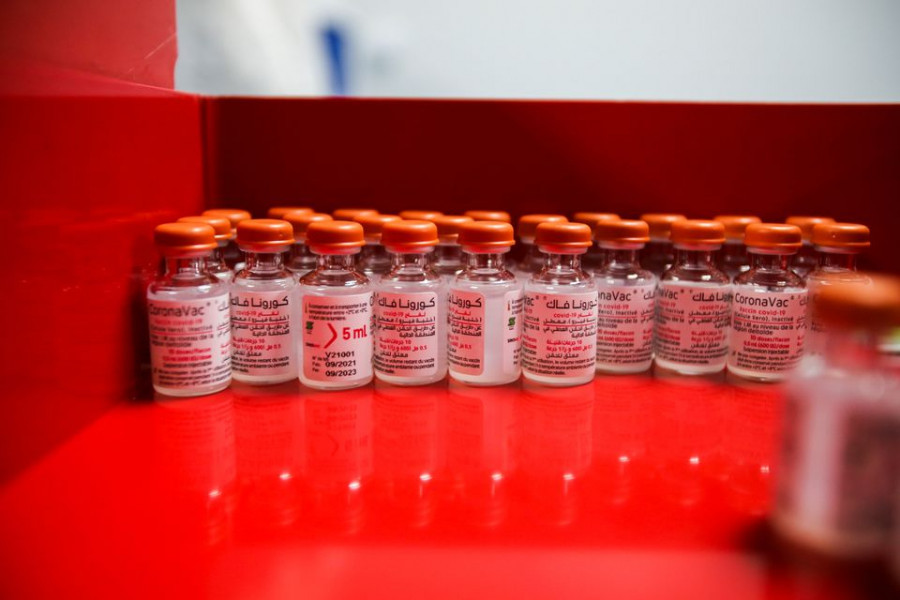Health
Sinovac-CoronaVac jabs supplied by China in March not to be rolled out immediately
Experts suggest using stocked doses at the earliest as Covid vaccines are being updated for new variants.
Arjun Poudel
With the uptake of the Covid booster shots plateauing out, Nepal’s Ministry of Health and Population has withheld the launch of the Sinovac-CoronaVac Covid-19 vaccine doses supplied by China in March.
The northern neighbour had supplied four million doses of the Sinovac-CoronaVac vaccine under grant assistance.
The vaccine doses supplied by China have a shelf-life of two years, so the authorities do not have a plan to immediately roll out the vaccine doses, according to Dr Surendra Chaurasia, chief of the Logistic Management Section under the Department of Health Services. “We will first use the Pfizer-BioNTech vaccine provided by Covax,” Chaurasia said.
Public health experts, however, said that it will not be too wise to keep the vaccine doses manufactured months ago in stock for long, as Covid variants are mutating continuously and pharmaceutical companies have been working to redesign their vaccines.
The US Food and Drug Administration has authorised the first redesign of coronavirus vaccines since they were rolled out in late 2020.
Studies show new variants of the coronavirus have impaired vaccine effectiveness, said Dr Prabhat Adhikari, an infectious disease and critical care expert. “Some countries have already started to use an updated version of the vaccine but we are planning to keep existing stock for a long time,” Adhikari said. “Authorities should instead focus on increasing the uptake of booster shots.”
Despite the fourth wave of the Covid-19 pandemic driven by the BA.5 sub-variant of Omicron hitting the country, the uptake of booster shots has been dismal.
Experts attributed the low uptake to the decline in severity from Covid infection and overall vaccine coverage rate.
The Health Ministry said as many as 7,972,791 people or around 27.3 percent of the total population have taken a booster shot as of Monday. The government had started rolling out the shots some nine months ago.
“Sinovac-CoronaVac Covid-19 will be rolled out only if a new wave of the pandemic hits the country and if new cases of infection start to surge rapidly,” Chaurasia said.
Due to the low uptake of booster shots, the Health Ministry requested the Covax facility, the United Nations-backed international vaccine sharing scheme, to halt the shipment of vaccine doses.
The facility, which has committed to supply 9.2 million doses of Pfizer-BioNTech vaccine—1.5 million doses each month from May to October—has so far supplied the second consignment of vaccine. The Health Ministry said there are over six million doses of the Covid-19 vaccine in stock including four million doses of Sinovac-CoronaVac Covid-19 and paediatric doses of the Pfizer-BioNTech vaccine.
Public health experts have long been stressing the need for increasing the vaccination coverage, with the vaccine being the only reliable medium to prevent severity and deaths from infections. They suggest that authorities should make micro planning, and launch awareness and door-to-door campaigns to increase vaccine coverage.
“Data show that unvaccinated people and those with impaired immunity have been getting severe and succumbing to the disease,” said Dr Sher Bahadur Pun, the chief of the Clinical Research Unit at the Sukraraj Tropical and Infectious Disease Hospital. “Even if new cases of Covid infection have declined of late, authorities concerned should continuously work to increase the vaccine coverage.”
Nepal’s Covid vaccination drive encountered problems galore from the beginning. First, there were vaccine shortages and mismanagement in their rollout. And now, despite having sufficient doses in stock, the authorities have not been able to increase the uptake.
Experts also stress the need for administering a second dose of booster shots.
Nepal has so far received 61,776,770 doses of Covid vaccines—AstraZeneca, Vero Cell, Moderna, Janssen, Sinovac-CoronaVac, and Pfizer-BioNTech—including pediatric doses.
As many as 22,324,933 people or 76.5 percent of the total population have been fully vaccinated as of Monday, according to the Ministry of Health and Population.




 11.84°C Kathmandu
11.84°C Kathmandu















